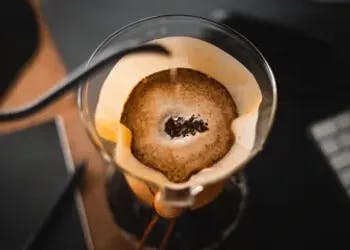
What is the Best Roast Level for Pour-over Brewing?

You might have bought the best pour-over equipment but you need to tick a few more boxes to get that magical cup of coffee. One of them is the right coffee bean roast level for pour-over.
There is an ideal roast level for each brewing method and pour-over has one too. Roasting can greatly affect your final brew so, we don’t want you to miss out on this. Stay with us as we unfold all about the best roast level for pour-over brewing.
Does roast level affect the taste of pour-over coffee?
Yes, the roast level does matter! Different roast levels can bring out distinct flavors and characteristics to your coffee. To exemplify, light roasts keep things fresh and bright with floral and fruity vibes, medium roasts strike a tasty balance with hints of chocolate, nuts, and caramel, and dark roasts go bold with smoky, earthy, and bittersweet flavors. They will all bring a unique vibe to your pour-over cup.
How can the roast level of coffee beans affect the pour-over brewing?
The roast level of coffee beans affects the brewing process in multiple ways and that stands true not only for pour-over but all methods of brewing coffee. Whether it's the grind size, water ratio, or extraction time, the roast level stays critical throughout the loom.
Light roast demands a fine grind and will need a shorter extraction time while darker roasted will best go with a medium-coarse grind and will take more time to brew. Also, darker roasts require less water than light roasts.
Best roast level of coffee beans for pour-over brewing
I recommend using medium-roasted coffee for pour-over. Medium roasts are often considered ideal for pour-over brewing because pour-overs are great at retaining a lot of flavor in the final brew. So with medium-roasted coffee, you can balance between the bright acidity of light roasts and the richer, caramelized flavors of dark roasts.
Impact of different roast levels on the taste of pour-over coffee
Every roast level will alter your cup of pour-over coffee significantly. Let’s see how.
Impact of light roast
They preserve the beans' original flavors, giving you a vibrant cup with floral, fruity, or tea-like notes. It's like a refreshing summer breeze in your mouth.
Impact of medium roast
Medium roasts bring out the best of both worlds. They keep some of the bean's natural flavors while adding some smokey goodness. Expect a smooth and well-rounded cup with hints of chocolate, caramel, or nuts.
Impact of dark roast
Dark roasts undergo a longer roasting journey, resulting in intense and robust coffee. The original characteristics of the beans step aside, making way for smoky, bittersweet flavors.
Wrapping up
Now we know that each roast level brings its own personality to the pour-over party. Light roasts flaunt brightness and acidity, medium roasts find that sweet spot between flavors, and dark roasts showcase depth and full-bodied-ness. So, pick your roast level wisely and embark on a flavorful journey that suits your taste buds. Happy pouring!
FAQs
1) Should you roast coffee beans on your own?
Roasting your beans can be quite an experience. It lets you control the roast level and experiment with flavors. As a bonus, you get that amazing aroma wafting through your place. But bear in mind that roasting takes practice and some trial and error. So if you're up for the challenge, go ahead and dive into the roasting world!
2) Is it better to buy pre-roasted coffee beans?
Buying pre-roasted beans saves you time and ensures consistency. Plus, there are tons of amazing roasters out there crafting flavourful coffee beans. But, be warned: pre-roasted beans might not match your specific taste preferences. If you're big on customization and like to experiment, roasting your own beans might be for you,
3) Manual vs electric coffee roaster: which is better to roast the coffee beans?
Manual roasters let you channel your inner coffee artisan. You control the process as it is hands-on and full of charm. Electric roasters, on the other hand, make it easier and more precise. It's efficient and takes away some of the guesswork. So, it all depends on your style and how involved you want to be.

I am a coffee aficionado based in Seattle. I have devoted my passion and expertise to perfecting the art of home coffee brewing. I became known for my exquisite pour-over and espresso creations. I source coffee beans from local roasters and explores ...



